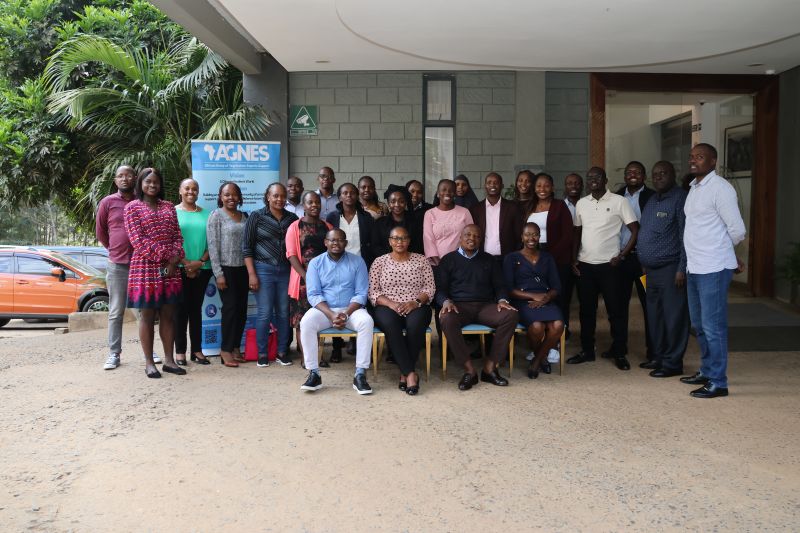
From October 21 to 24, 2025, the State Department for Arid and Semi-Arid Lands (ASALs), in collaboration with the AGNES and the Alliance of Bioversity International & CIAT, held an intensive Training and Working Session aimed at empowering national and county officials to develop a pipeline of bankable climate adaptation projects. This session, hosted in Machakos, Kenya, provided participants with the critical tools and knowledge to access climate finance and implement effective adaptation strategies for the ASALs.
Setting the Stage for Impactful Change
The workshop commenced with an overview of the current climate challenges faced by the ASALs, where the region’s vulnerability to droughts, floods, and other extreme weather events has been exacerbated by the growing impacts of climate change. Presentations from the State Department and experts from AGNES and CIAT set the tone by providing a comprehensive understanding of the climate landscape, existing interventions, and the urgent need for innovative financing solutions.
As part of the opening session, Dorcas Jalango from CIAT and Telvin Denje from AGNES respectively provided in-depth discussions on climate-smart agriculture (CSA) and the various climate finance instruments available, including grants, concessional loans, and multilateral mechanisms such as the Green Climate Fund (GCF) and Adaptation Fund. The importance of developing robust project proposals capable of attracting diverse funding sources beyond traditional donor channels was emphasized.
Translating Ideas into Actionable Projects
One of the key highlights of the workshop was the ideation session, where participants brainstormed solutions to the climate risks identified in the ASALs. Facilitated by the AGNES and CIAT, this session focused on identifying droughts, floods, and other climate threats as key challenges, then ideating potential solutions tailored to local contexts. Ideas ranged from sustainable water management projects to climate-resilient agricultural practices aimed at addressing the challenges of food and water insecurity in these regions.
The ideation session was followed by a group work session, where participants were split into two groups, one for the State Department and the other for the Regional Development Authorities (RDAs). Guided by the facilitators, each group developed project ideas based on the solutions suggested during the brainstorming session. The outcome was a set of initial project proposals, ready for further refinement.
Refining and Developing Project Proposals
Day two focused on further refining these project ideas into actionable proposals. Participants engaged in hands-on sessions aimed at developing a Project Concept Canvas, which helped clarify key aspects of the proposed projects, such as project scope, geographical extent, and alignment with national and county-level policies. A key focus of the session was teaching participants the criteria for prioritizing projects, emphasizing factors like feasibility, potential impact, and investment readiness. This approach helped guide participants in evaluating and refining their ideas to ensure they were both realistic and capable of attracting climate finance. Additionally, the session underscored the importance of conducting thorough research to avoid duplicating existing efforts and identifying potential partners, especially in the private sector, to enhance the project’s sustainability.
The session also focused on developing a climate rationale, where Majambo from CIAT emphasized the importance of connecting climate science to project development. He explained how climate data is essential for justifying the need for adaptation projects and for making them scientifically credible. Following this, participants were introduced to various climate data tools, such as the Adaptation Atlas and the Climate Knowledge Portal. These resources equipped participants with the necessary climate data to strengthen their project rationales. Telvin Denje from AGNES then introduced the IPCC Summary Generator Tool, which simplifies complex IPCC reports into actionable insights, enabling participants to incorporate evidence-based climate science into their project proposals.
The day concluded with the formation of three groups, where participants engaged in breakout sessions to refine and develop their final priority projects. During these sessions, they focused on enhancing their project canvases and climate rationales, ensuring that each project was well-defined and backed by credible climate data. This collaborative process allowed participants to receive peer feedback, refine their ideas further, and prepare them for the next steps in the project development process.
Developing Strong Project Frameworks
On the third and fourth days, the training shifted focus to more technical aspects of project development. Participants were introduced to the development of a Theory of Change (TOC), logical frameworks, and monitoring and evaluation (MEL) indicators. These frameworks are critical for designing projects that can demonstrate measurable impacts and meet the expectations of climate finance providers.
In addition, participants received training on budget development, ensuring that their financial plans align with the requirements of funding mechanisms. With guidance from the facilitators, participants refined their project ideas and prepared them for submission to climate finance institutions.
Progress and Next Steps
By the end of the workshop, participants had developed draft project proposals that were approximately 70% complete. Each proposal incorporated the key elements of a bankable project, including a strong climate rationale, clearly defined objectives, and realistic budgets. The workshop concluded with a plenary session where participants presented their working drafts and received feedback from facilitators and peers to further refine their projects. Looking ahead, the next steps involve finalizing these proposals and submitting them to relevant funding entities. The skills and knowledge gained during the workshop will enable participants to navigate the complex landscape of climate finance and drive the implementation of impactful climate adaptation projects in Kenya’s ASALs and share the knowledge to other colleagues.
Conclusion
This workshop marked a significant milestone in strengthening the capacity of the State Department for ASALs and its partners to mobilize climate finance for adaptation projects. By equipping officials with the tools to develop bankable proposals, the session has laid the foundation for scaling up climate action in Kenya’s most vulnerable regions. AGNES is committed to continuing its support in building technical capacity and fostering partnerships that will enable Kenya to unlock the necessary climate finance to tackle the challenges posed by climate change. This collaborative effort highlights the importance of building resilience through innovative solutions, strategic planning, and effective resource mobilization.
